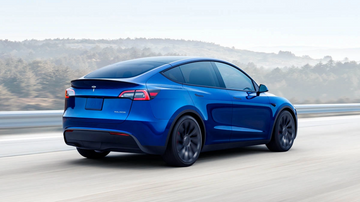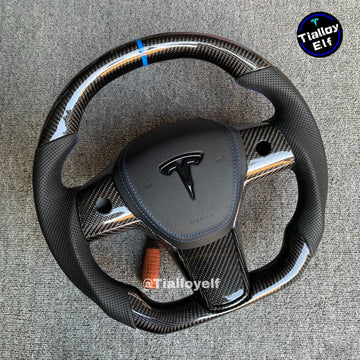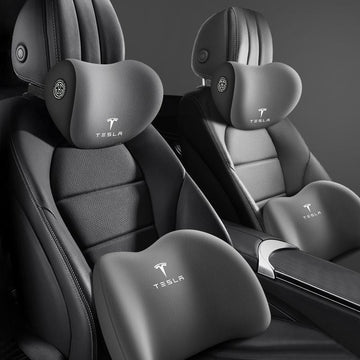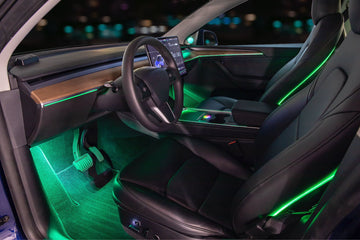News
Prospects and Challenges of Tesla's "Driverless Taxi" Test in China
bis ElfTialloy auf May 08, 2024

During Elon Musk's recent visit to China, he laid out an ambitious plan to test Tesla's Fully Self-Driving (FSD) system in the country and launch "driverless cabs". According to a report in China Daily, while Chinese officials did not immediately approve of Tesla's widespread use of the FSD feature, they said they "welcome Tesla to conduct some robot cab tests in China" and hope Tesla will "set a good example" in this regard ".
The Potential of Tesla's Driverless Taxi
Tesla's FSD technology has been one of the most forward-thinking and controversial parts of its product line. By applying this technology to cab services, Tesla could not only expand its market reach, but also potentially revolutionize the urban transportation ecosystem. Driverless cabs are expected to reduce traffic congestion and accident rates and improve the overall efficiency of the transportation system.
In addition, driverless vehicles show great potential to reduce carbon emissions and energy consumption, as they can manage driving speeds and route selection more efficiently. These advantages are in line with China's growing demand for environmental protection and sustainable development.
Challenges
Despite the attractive prospects, Tesla faces a number of challenges in promoting driverless cabs in China. First, safety is the biggest concern. Although driverless technology is advancing rapidly, it still needs to withstand prolonged testing in complex traffic environments to ensure its reliability and safety.
Second, regulatory constraints are also a major obstacle. China's legal and regulatory framework for self-driving cars is still being established, and Tesla will need to work closely with the Chinese government to ensure that its tests and operations comply with local regulations.
Future Outlook
According to officials' statements and market analysis, the Chinese government is open to new technologies, but at the same time will strictly regulate them to ensure public safety and interests. Tesla's driverless cab test in China may not only revolutionize the transportation system in China and the world, but is also an important demonstration of Tesla's technological strength.
Overall, Tesla's attempt is a major challenge to its technological innovation capabilities, as well as an important test of China's position in the global self-driving industry. In the next few years, as the technology matures and regulations improve, we expect to see driverless cabs widely used in China and around the world.
The advancement of Tesla's driverless cab program in China is not only a technology demonstration, but also a deepening of its strategy for the Chinese market. As one of the world's largest auto markets, China is highly receptive to new energy and self-driving technologies, offering huge market potential. Tesla's move, if successful, will greatly strengthen its competitiveness in the Chinese market and may accelerate the commercialization of global self-driving technology.
However, in the face of fierce competition and a strict regulatory environment, Tesla needs to focus more on communication and cooperation with government departments while refining its technology. Ensuring the safety and reliability of the technology, as well as complying with local laws and regulations, is the key to Tesla's long-term success in the Chinese market.
In the future, with the iterative upgrading of the technology and changes in the market environment, the performance of Tesla's driverless cabs in China will be the focus of attention of the global automotive industry, and its success or failure will largely affect the direction and speed of the development of autonomous driving technology.
The Potential of Tesla's Driverless Taxi
Tesla's FSD technology has been one of the most forward-thinking and controversial parts of its product line. By applying this technology to cab services, Tesla could not only expand its market reach, but also potentially revolutionize the urban transportation ecosystem. Driverless cabs are expected to reduce traffic congestion and accident rates and improve the overall efficiency of the transportation system.
In addition, driverless vehicles show great potential to reduce carbon emissions and energy consumption, as they can manage driving speeds and route selection more efficiently. These advantages are in line with China's growing demand for environmental protection and sustainable development.
Challenges
Despite the attractive prospects, Tesla faces a number of challenges in promoting driverless cabs in China. First, safety is the biggest concern. Although driverless technology is advancing rapidly, it still needs to withstand prolonged testing in complex traffic environments to ensure its reliability and safety.
Second, regulatory constraints are also a major obstacle. China's legal and regulatory framework for self-driving cars is still being established, and Tesla will need to work closely with the Chinese government to ensure that its tests and operations comply with local regulations.
Future Outlook
According to officials' statements and market analysis, the Chinese government is open to new technologies, but at the same time will strictly regulate them to ensure public safety and interests. Tesla's driverless cab test in China may not only revolutionize the transportation system in China and the world, but is also an important demonstration of Tesla's technological strength.
Overall, Tesla's attempt is a major challenge to its technological innovation capabilities, as well as an important test of China's position in the global self-driving industry. In the next few years, as the technology matures and regulations improve, we expect to see driverless cabs widely used in China and around the world.
The advancement of Tesla's driverless cab program in China is not only a technology demonstration, but also a deepening of its strategy for the Chinese market. As one of the world's largest auto markets, China is highly receptive to new energy and self-driving technologies, offering huge market potential. Tesla's move, if successful, will greatly strengthen its competitiveness in the Chinese market and may accelerate the commercialization of global self-driving technology.
However, in the face of fierce competition and a strict regulatory environment, Tesla needs to focus more on communication and cooperation with government departments while refining its technology. Ensuring the safety and reliability of the technology, as well as complying with local laws and regulations, is the key to Tesla's long-term success in the Chinese market.
In the future, with the iterative upgrading of the technology and changes in the market environment, the performance of Tesla's driverless cabs in China will be the focus of attention of the global automotive industry, and its success or failure will largely affect the direction and speed of the development of autonomous driving technology.
Verwandte Artikel




